This article was originally published by Tess Pennington at ReadyNutrition.com
Tess is the author of the widely popular and highly rated The Prepper’s Blueprint.
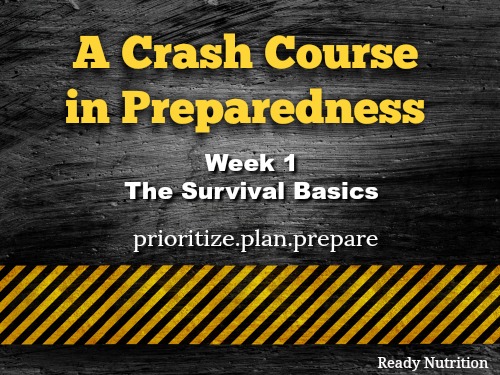
We’re ushering in National Preparedness Month with the first in a series of four preparedness guides. This crash course into preparedness will help you plan a strategy, position critical assets and greatly increase your chance of surviving many of the most common emergencies. While the subject of preparedness is an extensive one, we are going to break the basics down as much as we can so that you can stay focused and on track.
Before we start, I want to share my philosophy with you. A disaster of any kind rarely stops with the initial event. The aftermath can spiral, having the capacity to cripple our normal ways of life for a much longer time than we intended. This can last days, into weeks and even longer (depending on the circumstance). Because of this, it’s important to have a well-rounded approach to your preparedness efforts. I wholeheartedly believe in a layering concept when it comes to preparedness. You start at the beginning and slowly add more “layers” on preparedness until your family is fully insulated from the disaster itself. By accumulating items slowly and mindfully, you will stay organized and know that all of your bases are covered. I’ve broken the layers down into three groups.
- The first layer is the preparedness endeavors that prepare you for emergencies that have shorter-term effects. This is what we’ll cover today and basically, covers your 3-day emergency into two weeks. Having supplies in place to last up to two weeks will carry you through some of the most expected types of disasters.
- The second layer of preparedness encompasses the disasters that turn out to be much longer-lasting: job loss, extreme weather events, economic collapse, long-term power outages, and pandemics, to name a few. This requires more planning on your part but is a crucial investment in order to be prepared for these longer lasting disasters.
- The third layer of preparedness is acquiring supplies for those far from equilibrium events that have long standing consequences. In this type of disaster, you must prepare for the long haul and a complete change of lifestyle. These are events that encompass the end-of-the-world-as-we-know-it and we have to learn a new way of life including new skill sets that reflect an off-the-grid lifestyle.
While there are a lot of subjects in between the highlighted layers, we must keep this prepper truth in mind: How we choose to be prepared for a disaster event is solely our responsibility, and no one else’s.
In this course, the responsibility lies with you. I will provide you links to important articles, suggestions and even checklists to further your research but it is up to you to apply the information to your lifestyle. Let’s get started!
How prepared do you want to be?
Disasters of all types are an undeniable part of life, and the only thing you can change is the way you react to them. Having supplies in place to weather the storm is a great start, but far from the desired end result. To be prepared, and I mean fully prepared, requires planning, anticipating the worst-case scenario, and training for skill sets you will need while living through the event. You can’t just waltz into your local grocery store, grab some food, batteries, and water and then be done with it. You need to prioritize, plan, and prepare.
Prioritize your needs
Ultimately, the easiest way to begin preparing is to decide what types of disasters you are planning for (weather-related, natural disasters, mass evacuation, economic or personal disasters), and prioritize what your emergency plans will be based on those emergencies. The best way to begin assessing what your needs are is by reading and researching the disaster you are planning to survive.
Ready Nutrition has an immense amount of articles pertaining to specific disasters, so do a search and start your research. Many people start by preparing for the most likely emergency to occur in your area.
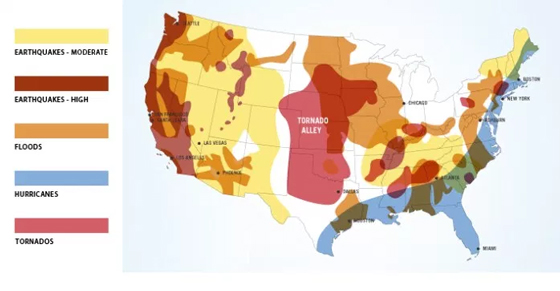
Do not limit your emergency planning to natural or economic disasters. Go a step further and plan for personal disasters that also tend to occur without warning (unemployment, divorce, death in the family).
Plan
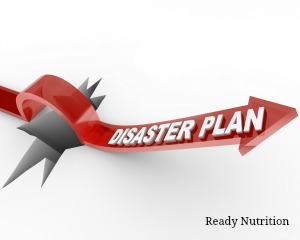
Researching and creating an emergency plan is the best way to stay organized and on point with your prepping.
Having a plan in place to determine what steps need to be taken by you and your family members when an emergency arises will ensure that all preparedness needs are covered. Now that your plan is beginning to come to life, it’s important to check and prepare the home. To start, every home should begin their preparedness endeavors with this checklist.
Complete this prepared home checklist
- Post emergency telephone numbers by phones (fire, police, ambulance, etc.).
- Teach children how and when to call 911 or your local Emergency Medical Services number for emergency help.
- Determine the best escape routes from your home if you plan on evacuating. Do you plan on bugging in or bugging out? If you are having problems deciding whether to shelter in place or evacuate, answer these two questions and you will know what you need to do.
- Find the safe spots in your home for each type of disaster.
- Show each family member how and when to turn off the water, gas, and electricity at the main switches.
- Check if you have adequate insurance coverage.
- Teach each family member how to use the fire extinguisher, and show them where it’s kept.
- Install smoke detectors on each level of your home, especially near bedrooms.
- Ensure that your family’s important documents are backed up and in a safe location.
- Before you begin investing into your preparedness supplies, take steps to get out of debt. Debt only enslaves you further, and simplifying your lifestyle can help break those shackles. Learn about these 6 ways to simplify your lifestyle.
- Create an emergency fund to begin funding your preparedness endeavors.
- Plan for the worst case scenario and have emergency I.D. cards made for each family member (including your pets) with current information provided.
Planning is the key to survival and the best way to start is with a “list of lists”
This list will become your Master List of preparedness needs, so keep it in an easy to access location. Your list will also help to navigate you through your preparedness plan. Ask yourself these pertinent questions and realistically answer them. After you determine what disaster you are planning for, sit down and begin to map it out. The way I started was by writing down all the main categories I needed to plan for. Here’s an example.
Short-Term List of Needs for Sheltering in Place for Two-Weeks After a Hurricane
- Water
- Food
- Clothing
- Shelter
- Communication
- Tools
- Fuel
- Skillsets
- Resources
When planning for a disaster follow these beginner protocols:
- Choose an evacuation location and let family members know where your destination is, the contact information, a secondary destination, etc.).
- Decide on the duration of the disaster you are planning for (3-day, 2 weeks, extended or longer-term disasters).
- Create a financial plan on how much money you can contribute to your preparedness budget. Keep in mind that prepping can be expensive initially, so it’s best to start investing in your basic needs first: food, water, shelter, clothing, safety, and communication. You can add additional prepping items once the basics are covered.
- Try and find items that are light weight, functional and versatile so that if you have to carry them for long periods it will not be a strain.
- Ensure that you have contingency plans put in place in case your first plan does not work out.
- Plan and prep for the environment you are living in.
- While we all make mistakes, the ones made during a disaster can be very costly. This is why it is essential to plan out a worst-case scenario and know which mistakes are the most common.
- Essentially, you want your beginning preparedness list to look like this short-term emergency checklist.
Prepare

You need to understand the disaster you are planning for, how to be mentally and spiritually prepared for it and, ultimately, what supplies and skills you need to thrive.
Many of the items that often disappear as a result of a disaster are items that protect your basic needs. While a popular prepper adage is to prepare with the 3 B’s: beans, bullets, and band-aids, there are more concepts to consider. Therefore, it is best to begin with these fundamental disaster items to meet your basic needs: food, water, clothing and shelter and then add more preparedness layers onto this initial foundation. However, many decide to expand their disaster supplies to encompass a longer duration so that if a delayed emergency response occurs, it has little effect on them. This is why preppers believe in having “back-ups for their back-ups.”
As well, do not forget about preparing items for your pets! They are depending on you to make sure they have everything they need to.
Water
 First and foremost, you need a dependable water source following a disaster. Your initial line of defense would be the two week supply of bottled water that is recommended, but because this need is your top priority, it is highly recommended that you get a water filtration system like the Katadyn water filter or a Berkey Filtration System. That said, many believe the suggested amount of water by disaster organizations is grossly underestimated.
First and foremost, you need a dependable water source following a disaster. Your initial line of defense would be the two week supply of bottled water that is recommended, but because this need is your top priority, it is highly recommended that you get a water filtration system like the Katadyn water filter or a Berkey Filtration System. That said, many believe the suggested amount of water by disaster organizations is grossly underestimated.
If we go by the suggestion from emergency organizations and have 1 gallon per person per day, a family of 5 will need 35 gallons of water per week.
Victims of previous disasters say the suggested water amount stated by disaster organizations is not nearly enough to get through a disaster. Conway Yee’s family went through the aftermath of Hurricane Sandy and were without power or their well water supply for a week. To keep hydrated and clean, “we went through 20 gallons a day” for drinking and washing, he says. That’s 120 gallons of water for the week after the hurricane. With that in mind, you want to consider these alternate solutions to boost your short-term water supply.
With water being one of your most important preps, play it safe and double the amount of water needed. The extra water can be used for other purposes like sanitation, cleaning, etc. As well, because many water sources are questionable following a disaster, water can quickly become scarce, so it is important to remember there are hidden water sources found in the home to fall back to. As well, it is also advisable to have alternate ways to treat your water.
As a precaution, keep a bottle of unscented liquid chlorine bleach with your water supply for cleaning and sanitizing and for disinfecting water.
Food
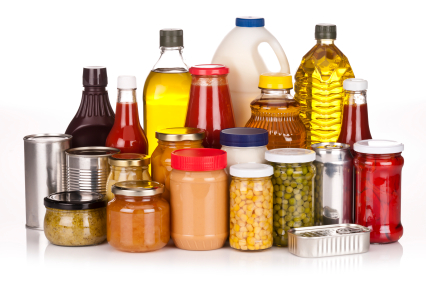 Once you have your water supply in place, it’s time to begin stockpiling some food for emergencies. The overall goal of having an emergency food pantry is to have a wide array of nutritious foods stored away in order to carry us through an emergency. Start out with a supply of non-perishable food that doesn’t require a lot of cooking time (if any).
Once you have your water supply in place, it’s time to begin stockpiling some food for emergencies. The overall goal of having an emergency food pantry is to have a wide array of nutritious foods stored away in order to carry us through an emergency. Start out with a supply of non-perishable food that doesn’t require a lot of cooking time (if any).
Ensure that you have foods suitable towards survival. Foods that have the sustaining energy sources to burn slowly. Finding foods that are high in complex carbs and dietary fiber are far more efficient from a dietary standpoint and will keep you feeling “fuller” longer. This could go a long way if you are planning on rationing your food in an extended emergency. Also, stay away from overly salty or sweet foods. This will only increase your need for water and since your food stores are a precious commodity, you will want to try and avoid these types of foods.
Using a food storage calculator will help you to determine how much food is necessary. It is important to factor in your caloric intake, especially during an emergency. Your activity level could drastically increase in a disaster due to aftermath cleanup and other activities. These are some considerations to keep in mind before purchasing the food items:
- It’s best to find items that have expiration dates that are 1-2 years away from expiring, unless that item is used frequently in the home, and can be rotated frequently.
- Typically, the best sales are advertised in the newspaper flyers. There are stores that have 10 items for $10, or 2-for-1 offers. You don’t have to break the bank to get stocked up. Just get a little each time you visit the store. In season vegetables are typically cheaper. Larger volume packages are often a better price
- Shop with the number of people in the household in mind. Also consider their preferences, food sensitivities, and appetites.
- Get a wide variety of food to help reduce food fatigue.
- Don’t rely on junk food. It’s especially important to keep your strength up and remain healthy during an emergency. Purchase supplies that are loaded with nutrients.
- Store food in a dark, cool area of the home and protect your food investment by reducing oxidation of foods, bug infestations, and exposure to increase temperature and moisture levels.
- Be aware of any special health considerations for family members. Make sure you have supplies for family members with allergies and intolerances, as well as issues like hypertension or diabetes.
- Store what you eat, and eat what you store. By following this adage, you will not end up throwing away expired food, and you won’t serve up something completely unpalatable during a crisis situation.
Here are some suggested food items to have stored:
- Peanut butter
- Whole wheat crackers (consider vacuum packing to prolong freshness)
- Nuts and trail mix
- Cereal
- Oats
- Pasta
- Plant-based cooking oil
- Power bars and granola bars
- Dried fruit
- Just add water meals (Hamburger helper, pasta meals, etc.)
- Canned meat such as tuna, salmon, chicken, and turkey
- Canned vegetables such as beans, carrots, and peas
- Canned soups and chili
- Sports drinks
- Sugar, salt, and pepper
- Coffee, tea, hot cocoa
- Powdered milk
- Powdered drink mixes
- Seeds for sprouting
- Multivitamins
Here are 25 must-have foods to put in your pantry.
Canning meals is also an option you should consider. This gives you more control of your dietary requirements, gives you more meal options, helps provide “normal” food during difficult times. One thing I hear a lot from disaster victims is how they wish things would go back to normal. Having some of the family’s favorite foods canned and stored away would do wonders for morale.
As well, I highly recommend storing a variety of heirloom seeds. These can be to grow sprouts for emergency nutrition and for gardens for long-term food sources. You could also plant edible flowers. Not only will they be lovely to look at, but they will provide sustenance when you need it the most. Alternatively, if you can locate food packing plants or warehouses in your city, that may be a good place to allocate additional food reserves if yours runs out. This article can provide information on foraging for weeds.
Find the best deals so you don’t blow your budget
Mentioned earlier is the importance of having a budget for prepping. It’s easy to go crazy wanting preps to get your home ready. But you can do this without blowing your budget. The large volume supermarkets typically have better deals than the smaller stores. Map your shopping route based on local ads from the large supermarkets to save on gas money as well as on shopping time. Even dollar stores carry canned goods and food products for short term/long term food supplies. Look for the best sales and buy as much of the item as your budget will allow. For a more in depth first time shopping list for your prepper, consider adding these items, as well.
You can also pack your own MREs to save money and to ensure your family has foods they will eat. Here are some tips and suggested foods to do this.
On another note, there may come a time when you run out of your food stores and need to go to the store in the aftermath of a disaster. If this occurs, be prepared for regular food staples to be in limited supplies. Foods like bread, milk, and eggs usually are the first items that run out. We saw that during the aftermath of Hurricane Harvey. If you find yourself in this situation, look for alternatives to those foods.
Start with a 3-day food supply and keep prepping
I have found that when starting your preparedness measures, it is best to start at the beginning in order to ensure you have everything you need to build up your preparedness foundation. Start your preparations with a 72-hour kit and then create a vehicle 72-hour kit. Once that is complete, you can begin ensuring your basic needs are met for longer periods or begin targeting other layers of preparedness. This is the foundation of your preparedness supply.
A 3 day or 72-hour kit is small enough that items can be added to a backpack to take with you in the case of a sudden disaster that comes without warning. These preparedness kits should be made for all members of the family that can account for their basic needs for 3 days. Once your 3-day supply is secure, you need to move on to expand disaster supplies to encompass more areas of preparedness.
Communication
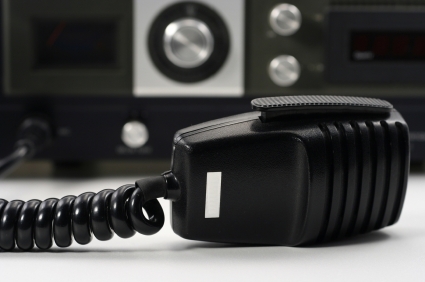 Consider, for a moment, how drastically your life would change without the continuous flow of energy the grid delivers. What would our lives be like without access to communication channels telling us what is going on? How vulnerable would we feel not knowing what is going on around us? For that matter, how would we get in touch with loved ones to let them know how we are?
Consider, for a moment, how drastically your life would change without the continuous flow of energy the grid delivers. What would our lives be like without access to communication channels telling us what is going on? How vulnerable would we feel not knowing what is going on around us? For that matter, how would we get in touch with loved ones to let them know how we are?
Communication during a disaster can be quite troublesome given that the power grid goes down during most natural disasters. Sadly, during these types of disasters, family and loved ones need those communication channels up the most and it can be quite frustrating when they aren’t.
Prepare ahead for this!
According to the CDC, families should develop different methods for communicating during emergency situations and share their plans beforehand with all those who would be worried about their welfare. Options for remaining in contact with family and friends if a disaster strikes include:
- Phone contact with a designated family member or friend who is unlikely to be affected by the same disaster.
- Email notification via a family distribution list.
- Registration on the American Red Cross Safe and Well Website.
- Use of the toll-free Contact Loved Ones voice messaging service (1-866-78-CONTACT).
Types of Emergency Communication Channels
Cell Phones/Computers
At first glance, there is little potential for these devices when the grid goes down. Without the multitude of servers that are scattered around the globe and the electricity that feeds them, our computers are nothing more than bulky hard drives. Cell phones might still work for a little while since some cell towers have backup batteries and solar panels, but their use might be short lived.
However, don’t be too quick to scoff at the prepping potential of these devices. Computers might still be useful for communicating in some cases. It’s fairly easy to create a local wifi network (aka ad hoc network) between computers that are within range of each other. This would allow people living on the same street or in the same apartment building to talk to each other, provided they can generate their own electricity.
The better solution would be to create a local network for cell phones that isn’t reliant on any infrastructure. Their energy demands are far less than other computers, their range is longer than wifi, and they are of course, mobile. The technology for creating a peer to peer network between cell phones has existed for some time now, but unfortunately, it has yet to be sold to the public. Companies like Terranet have been perfecting it over the past few years, and they estimate that about 30% of cell phones will be capable of making these networks with a simple software change. So right now, cell phones will be pretty much useless when the grid goes down, but that may change before the end of the decade.
Ham Radio
When most preppers think of communications, ham radios usually come to mind, and for good reason. They can communicate to other radios over hundreds of miles, and they may be the only form of very long distance communication when all else fails. Unfortunately, they wouldn’t be very useful for the average person.
They use a lot of electricity, the equipment can be pretty expensive, and only about 700,000 Americans are licensed operators. Still, if even a fraction of them are up and running after a major disaster, they will play a crucial role in the relief effort. Due to their limited numbers and the amount of resources that are required to keep them running, you won’t see them being used for casual conversation, but you will see them used by communities for conducting commerce and coordinating reconstruction efforts.
CB Radio/Walkie Talkie
I suspect that CB Radio’s and Walkie Talkies will be the main form of communication for the average person, and they are the best candidates for filling the gap that cell phones and internet providers would leave behind. If anything, CB radios were our parent’s version of the internet. They were affordable and accessible, you had to learn the lingo to use them, they allowed you to communicate anonymously, and much like the internet, they were used to skirt the law from time to time.
There are millions of CB radios lying around, and many of them are still being used by truckers today, so they will be available to many of the survivors. More importantly, they don’t use too much electricity, they’re more user-friendly than ham radios, and some of them are portable. Depending on the conditions you’re using them in, their range can extend anywhere from 1 to 25 miles.
As for walkie talkies, I don’t have to tell you how useful they could be. Much like the wifi network I spoke of earlier, these will be pretty handy for staying in touch with your neighbors. Together, CB radios and walkie talkies will be most common form communication after a disaster.
Courier
If the grid is down long enough, eventually some enterprising citizens would start to provide courier services. Whether it’s by foot or by bicycle, they will fill an important niche that other items on this list can’t provide, and that is a secure form of communication. If you had to send a message to someone who lives out of the range of your radio or wifi network, and you needed that message to remain a secret, writing that message down and sending someone out to deliver it by hand would be the only way to do it. Wifi just doesn’t have the range, and radios are too easy to listen in on.
Fuel
 So, the power is out. You have all of this wonderful food stored away but no way to cook it. Before you resign yourself to baked beans at room temperature out of the can, consider your options. You may not have a functioning kitchen but you can still do some cooking.
So, the power is out. You have all of this wonderful food stored away but no way to cook it. Before you resign yourself to baked beans at room temperature out of the can, consider your options. You may not have a functioning kitchen but you can still do some cooking.
As with all things related to prepping, you should have a backup plan, and a backup plan for your backup plan, and if you can, one more for good measure. Further, having an ample supply of items to use to create fire with will be paramount in an emergency situation. Therefore, keep the following items stocked up in your supplies:
- Stock plenty of fuel for your cooking methods. (Be sure to store your fuel properly and in accordance with local fire regulations.)
- Store matches in waterproof containers.
- Lighters
- Dry wood
- If you have a place to store them, tightly roll newspapers and magazines to use for fuel. You can also use newspapers to biomass logs.
- Fireproof cooking vessels
If a fire is not an option for cooking there are several alternatives you can turn to. Here are some popular options for alternative cooking sources
- Camping propane stove
- Rocket stove
- Solar funnel cooker
- Propane or charcoal BBQ grill
- Charcoal Hibachi (you can burn nearly anything in this as long as it is non-toxic)
- Outdoor fireplace
- #10 Can cookstove
- Sun Oven
- The Wonderbag
Whichever type of cooking vessel you use, make sure you have an ample supply of fuel to use. Whichever fuel you decide, store an ample supply. For example, if you choose to grill food using a BBQ grill, understand that one large bag of charcoal briquettes will last for about 4 cook outs. If you’re preparing for a 10-day emergency, you will need 10 bags of charcoal. As well, temperatures can affect the amount of fuel you use as well. For instance, low temperatures and the wind can greatly influence the amount of propane you use on camping stoves. It can increase the amount of fuel used by three! My family has an indoor wood burning grill,
In such a case, I like to have multiple ways to cook emergency food. My family has an indoor wood burning grill, we also own a rocket stove and a solar cooker. We have an outdoor grill too but in a dire emergency situation, we want to maintain OPSEC (operational security) and do not want all the neighbors knowing we have food. A fear of many preppers during the beginning stages of a true SHTF event is how our smells, as well as the aromas from foods we prepare, could attract unwanted visitors. Cooking food can be smelled in best conditions up to a half mile or so. Further, those who have gone without food for days on end will have a heightened sense of smell and will use this to their advantage. Keep this in mind when choosing how you will be preparing food.
Tools
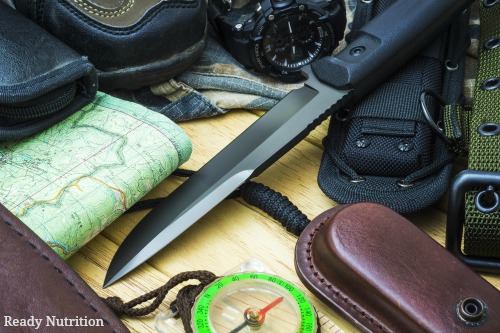 The right tools are a valuable commodity when it comes to survival and essential items to have on hand for hunting, digging, cutting, communicating and navigational purposes. A 72-hour bag should have all items necessary to survive for 3 days. Bottom line is your preparedness tools are your life line and without them, you could be ill-equipped in a survival situation.
The right tools are a valuable commodity when it comes to survival and essential items to have on hand for hunting, digging, cutting, communicating and navigational purposes. A 72-hour bag should have all items necessary to survive for 3 days. Bottom line is your preparedness tools are your life line and without them, you could be ill-equipped in a survival situation.
The ten tools listed below are some of the most important survival tools that should be in your 72-hour bags. Of course, other items can be included, but these essentials are a must-have for every survival pack. Practice using these tools regularly so that you know their capability and their strength.
- Knives (large machete type and a smaller Gerber hunter)
- Multi-tool
- Camping shovels
- Candles
- Hammer
- Hatchet
- Collapsible fishing pole with hooks, line, bobbers, etc.
- Flares
- Maps, compass or GPS devices (Having extra compasses ensures that navigation is accurate).
- Rope or paracord
- Knife sharpening stone
- Flash light with extra batteries (get one flashlight for each family member)
- Headlamps
- Light sticks
- Fire starting supplies including a lighter and a magnesium rod
Read more about essential survival tools here. As well, consider having separate supplies for your vehicle.
Not only will you need the above-listed tools, but you will also need tools if your home has been damaged by a disaster. In the backbreaking early stages of rubble removal, simple hand tools will play a vital role in transporting and removing debris. Acquiring basic hand tools—shovels, axes, and hammers—meet immediate demolition needs and then take on a long-term role once construction resumes. The tools used in the first phase of reconstruction were:
1. Round point and square nose shovels, preferably heavy-duty variety with extra long blade socket.
2. Pick axe
3. Pulaski Axe
4. Rig builder’s hatchet
5. Axe
6. Bow saw
7. 24-oz. framing hammer
8. Sledge hammer
9. Digging bars, preferably both pointed and chisel tip varieties; crow bars.
10. Leather or synthetic work gloves
11. Protective eye wear
12. Hard hats
13. Dust masks
14. Contractor-grade wheel barrows
15. Bolt cutters
16. Large-diameter heavy-duty weatherproof rope; small-diameter light-duty line
17. Rope hoist/pulley, minimum 250-lb. capacity
18. Folding knife
Quite simply, having these tools and equipment on hand will help you operate in a non-technological environment. The bottom line is your preparedness tools are your life line and without them, you could be ill-equipped in a survival situation.
Written Survival Information
 In a high-stress situation, it’s easy to forget the basic how-tos of tasks that you don’t perform every day.
In a high-stress situation, it’s easy to forget the basic how-tos of tasks that you don’t perform every day.
Many survival manuals and printouts can easily be downloaded onto a flash drive to be taken along in your bug out bags. Don’t underestimate the value of a spiritual book to boost the morale.
You want books like:
- Survival Manuals (This small manual fits easily in most purses or backpacks and is loaded with information for nearly any situation)
- First Aid Manuals
- The Prepper’s Cookbook
- Native American Survival Handbooks
- Boy Scouts Handbooks
- The Prepper’s Blueprint
- The Bible or other spiritual literature
I like to have hard copies of important books on hand at home. If the power is out, you may not be able to access e-books or websites.
Security
 The reality is that the vast majority of people have about three days of food and water at home and when a prolonged disaster strikes it upends the stability of the entire system of just-in-time delivery. When those delivery trucks stop delivering, things can be pretty dicey.
The reality is that the vast majority of people have about three days of food and water at home and when a prolonged disaster strikes it upends the stability of the entire system of just-in-time delivery. When those delivery trucks stop delivering, things can be pretty dicey.
Most people strive to make their homes safe and secure. We install motion lights, fence the yard and make windows difficult to open. We have good quality locks on the doors and sometimes burglar alarms, as well. But all it takes is opening the door to the wrong person, or someone throwing a lawn chair through a glass window.
In a disaster situation, these security measures may not be enough. We need only to look at the aftermath of hurricanes and other natural disasters to see that looters are out in full force, taking advantage of the people who have already lost so much. As we’ve said here before, “If you can’t protect it, you don’t own it!” This is a common human response to disasters and most preppers know this which is why they have guns and ammunition with which they will defend their homes and families.
But let’s explore some other ways you can protect your home and belongings. One way is to understand the mind of the criminal. An MSNBC affiliate out of Atlanta recently did just that. They sent letters to 86 people who had gone to prison for burglary and asked them a variety questions about their crimes. Their answers could tell you a lot about how to protect your home from this crime. What they told reporters included the following:
- Don’t advertise what you own. One burglar admitted to looking for homes that had cars with NRA bumper stickers, which would indicate that there are plenty of guns to steal there.
- Burglars don’t just look in obvious places. If they feel safe, they’ll tear everything up looking for hidden valuables.
- The best time to break into a house was between 12:30 and 2:30, because it’s rare for both kids or adults to be home at that time period.
- Not all burglars are intimidated by security alarm signs and cameras, and many admitted to knowing how to disable alarms. Some suggested that cameras would indicate that there are valuables in the home.
- As you might expect, burglars are terrified of large dog breeds.
- Burglars aren’t typically killers. They don’t want to a serious confrontation with a homeowner, so any sign that someone is home is a deterrent.
You can read more about that here, but essentially, if you know what to expect, then you can better prepare for it. Remember – prioritize, prepare and plan for what may come.
Preventative measures can be put in place to keep criminals far away from your home. Minimize the threat of a home break in or home invasion by adding layers of security to prevent your home from being a possible hit. Security layers are preventative measures put into place that will advertise to possible intruders to avoid your home altogether.
Having firearms on site will help you reinforce these security measures and continue protecting your home. By training with these weapons, you will be familiarizing yourself with firearms you will definitely see in one way, shape, or form in a SHTF scenario. Learning how to operate these will stimulate you to develop skills and perhaps to purchase one or more in civilian/legal ownership form. There are also plenty of qualified instructors to be found in these ranges, and a high-end range that is worth its salt will provide one for you to familiarize you with the weapon free of charge before you fire it.
The 3 Security Layers for the home
Layer 1: The Outside Layer
- Reinforced doors and locks. There is only 1 ” of wood protecting you in normal door locks.
- Invest in heavy duty door hinges and secure door frames with 3 ” screws.
- Barred windows or European-style security/storm shutters.
- Doors that are not glass or see through.
- Install a peep hole for the door.
- Never rely on a chain latch as an effective barrier (they are easily broken if the door is kicked in).
- Install infrared flood lights or motion detector lights around the perimeter of the home.
- A gate at the front of the driveway that has spikes at the top to prevent someone from jumping over the fence
- Never leave a spare key hidden under a rock or door mat. Too many people do this and it is the first place a criminal is going to look.
- Cut back large trees or bushes near the windows to provide concealment. Additionally, putting thorn bushes and other types of plants to further secure the home would be advantageous.
- Have a guard dog trained to attack. And place “beware of dog” signs on the front and side gates of the home.
Layer 2: The Inside Layer
- Consider adding a 2-way voice feature to the existing alarm system. This feature enables your security system to communicate directly with the control panel. This feature also allows you to call into your system and be able to listen to any activity or speak to your child or other family members who are home.
- Position web cams strategically in hidden areas. Place the computer that is monitoring the locations in a hidden spot so the criminals do not walk off with the computer.
- Have emergency plans and protocols set up where children or teens can see them. Additionally, have important contact phone numbers next to the plan.
- Teach the household how to call 9-1-1, and have a script ready for them to read to the dispatcher. This will help keep them explain calmly to the dispatcher what the emergency situation is.
- Teach members of the home different escape routes to use in case they need to leave the home, as well as a code word to use for the family to immediately leave the home to go to a safe location.
- Close all curtains and blinds at night time and set the alarm.
- Keep purses, car keys, money and jewelry away from windows where burglars can look in and see. This only makes them want to break in more.
- If a gun is in the home, have it locked up or put away so that smaller children do not try to use it.
Layer 3: The Personal Layer
This is the most critical layer.
- Teach family members to be observant of their surroundings when coming home and be aware of suspicious activity.
- Never open the door to strangers. Teach children not to be easily persuaded by strangers who look professional or have badges.
- Teach children to call “safe” adults, such as neighbors for help in cases where parents are not home.
- Get to know your neighbors and have their phone numbers on hand in case the child needs help from a nearby adult.
- Or, arrange a neighborhood watch program.
- Never be afraid to call the police if a stranger or solicitor is acting suspiciously.
- Teach children how to use the security alarm and where the panic button is.
- Find a bug out location for family members to go to for safety.
- If someone is trying to break into your home, activate your car alarm or panic button on the security alarm to draw attention from the neighbors.
- As a last resort, teach older members of the home and older children how to use weapons against intruders.
In many cases, the local officials will be just as confused as you and may give mixed messages on how serious the situation is. In their defense, the information they are getting is constantly changing and informing the public is difficult at best. Knowing this will help you ensure your preparedness plans are solid.
In an even longer-term situation, more plans for defense would need to be made, with perimeters, night watches, and an organized plan.
Skills
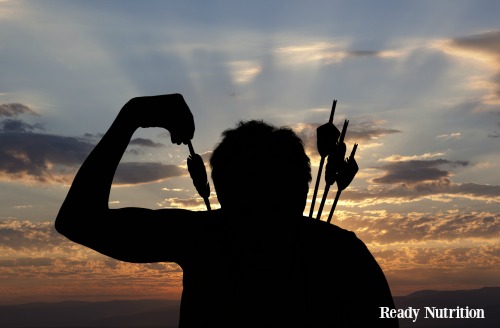 Once you move past the basics of prepping, the best thing for your plan is to learn a new skill or two. Remember, in an emergency situation there won’t be a repair shop to take your tools to or a grocery store to buy more food from. When the SHTF (Stuff Hits The Fan) you’ll be left to rely on the skills you have, and with no Internet available to look up information on, you might be stuck.
Once you move past the basics of prepping, the best thing for your plan is to learn a new skill or two. Remember, in an emergency situation there won’t be a repair shop to take your tools to or a grocery store to buy more food from. When the SHTF (Stuff Hits The Fan) you’ll be left to rely on the skills you have, and with no Internet available to look up information on, you might be stuck.
Mastering some basic off-the-grid skills will greatly enhance your survivability
Because many people are not adequately trained to handle the disaster situations in which they find themselves in, having the proper skills and training will provide an individual with a well-diversified knowledge base to help them survive during and after a disaster.
Not all Skills Are Created Equal
It is important to emphasize that some skills are more important than others. The first I would recommend are those skill sets that will enhance your off-grid environment.
- Outdoor survival course
- Medical training
- Disaster classes
- Canning and food preparation
- Firearm training
- Amateur radio classes
- Exercise and weight training (get your body into shape)
- Gardening/food production classes
Basically, any class that fits your basic survival needs, take it! As well, don’t neglect the primitive skills one can learn too. Many of these skills will carry you into longer-term preparedness measures, so the more you know the better.
One area of skills we all need to focus our attention on is self-defense. Self-defense is a crucial skill that we all should know, and it takes time to develop these skills. No doubt there have been times where you may have found yourself in a situation where you looked around and didn’t feel comfortable, and in some cases, the situation had the potential to quickly become dangerous. It’s important to have situational awareness and be aware of your surroundings at all times. If you do not feel comfortable, don’t feel bad about getting out of the situation altogether. As well, trust your gut. When your intuition is making your “Spidey senses” go off, it’s time to get out of there.
In many cases, predators watch their potential victims before they strike. In a study regarding how predators selected their victims, pedestrians were videotaped walking down a street and had incarcerated convicts view them. Within seven seconds of viewing the pedestrians, the convicts had selected their targets. Selections were not based on gender, size, age or race, but rather on the body language exhibited. The convicts identified the following body language cues used as their basis for victim selection:
Posture: People that walked with shoulders slouched or slumped were selected as victims as opposed to those who walked with their chin up.
Gaze: Those avoiding eye contact were chosen as victims because of the perception that they were preoccupied. Making eye contact naturally communicates confidence.
Stride: People who walked with a stride that was too long or too short, or those who shuffled or dragged their feet, were selected over those who had a smooth and natural gait.
Rate: Those who walked slowly with no apparent purpose, and those who walked fast as if they were uncomfortable, were selected over those who walked naturally and deliberately.
Fluidity: Those who demonstrated awkwardness in their movements were chosen over those who seemed to glide as they walked.
Wholeness: Those who swung their arms wildly while walking were selected over those who moved from their center, with coordination and balance.Physical impairments may prevent some people from projecting confidence. If they fail, victims must decide whether or not defensive action is necessary and appropriate. Carrying a concealed firearm can level the playing field, but retrieving it may not always be possible. Introducing a firearm into a volatile situation isn’t always the best response. That determination is dictated by the totality of the circumstances. Two studies may provide helpful insight when making that decision. (Source)
Learning how to fight is your last lifeline of protection. Learning escape and evasion tactics, self-defense strategies like Krav Maga or even learning to use everyday objects to protect yourself can enhance survival. The most important aspect to learn is not to hesitate when confronted. Again, this skill set takes time to master but may save your life.
Conclusion
Disasters do not just happen to other people – they can happen to you. When you are prepared for a particular scenario, then you already have tools in place for when you need them the most. While many feel that preparedness is an enormous endeavor, when you break it down into organized lists, it’s not so daunting. Keep prepping and keep an eye out for our next preparedness guide.
Remember to fall back on your list of lists to ensure that you are purchasing the needed items for the disaster you are preparing for. Have a well rounded short-term supply to compliment your long term food items. Store your emergency supplies in an easy to access part of your home where natural elements such as sunlight and moisture are not an issue.
As well, keep in mind that once you get your preps, you will need to maintain them to ensure your emergency items are ready to go. Your gear can best be maintained according to a maintenance schedule and you can get a start on it now. Some preppers do it twice a year when Daylight Savings Time hits. But it’s more than giving it a glance and it doesn’t just mean cleaning it. It also means inspecting it for serviceability and function. It means making sure that it’s well organized and that you can pick it up at a moment’s notice. You can’t do that unless it’s ready.
Course Discussion
We all have a way to help others prepare. New preppers, if you have questions, leave them in the comment section and as a community, we can help to answer them. You’re not in this alone. I know this information provided is a lot to take in, just pace yourself, have fun with it, and we are all here for you if you need it.
Sign Up For This Week’s Giveaway!
We’re giving away The Prepper’s Blueprint – widely popular and highly rated preparedness manual and a 72-hour kit at the end of this week to a lucky winner.
All you have to do is sign up for our newsletter and leave a comment in one of our weekly Crash Course guides about what you feel the most important aspect of being prepared is in the bottom of the article. Good luck everyone!
Additional Reading:
Essential Prepping Calculators
20 Preparedness Articles To Help You Get Prepped
The Prepper’s Blueprint: A Must-Have Preparedness Manual
20 Additional Preps You Want in the Car for Urban Survival
Tess Pennington is the author of The Prepper’s Blueprint, a comprehensive guide that uses real-life scenarios to help you prepare for any disaster. Because a crisis rarely stops with a triggering event the aftermath can spiral, having the capacity to cripple our normal ways of life. The well-rounded, multi-layered approach outlined in the Blueprint helps you make sense of a wide array of preparedness concepts through easily digestible action items and supply lists.
Tess is also the author of the highly rated Prepper’s Cookbook, which helps you to create a plan for stocking, organizing and maintaining a proper emergency food supply and includes over 300 recipes for nutritious, delicious, life-saving meals.
Visit her web site at ReadyNutrition.com for an extensive compilation of free information on preparedness, homesteading, and healthy living.









0 Comments